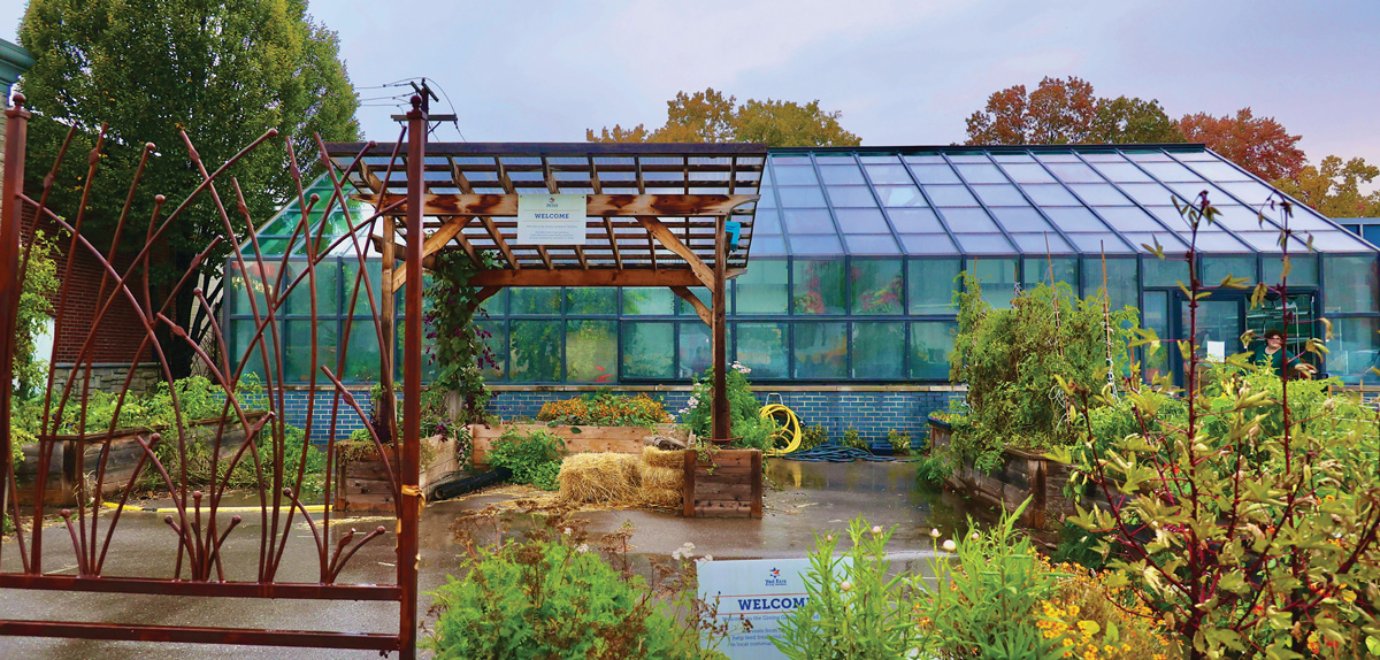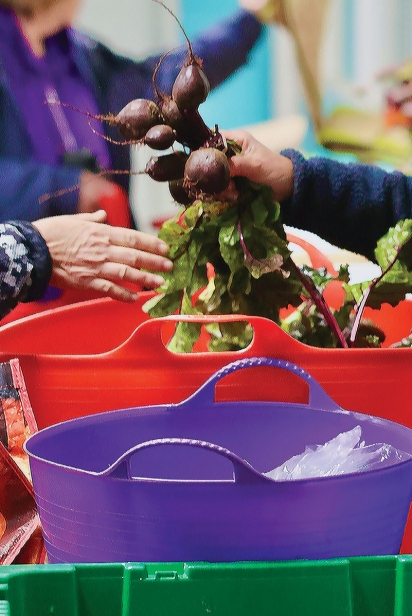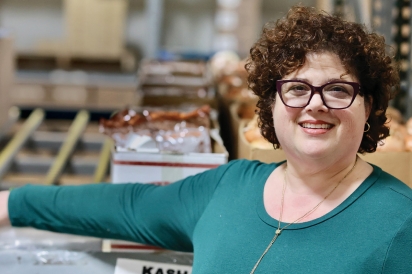Yad Ezra Reaches Out with a Helping Hand
Michigan’s only kosher food pantry was started more than 30 years ago to serve the large influx of immigrants who needed culturally relevant groceries. Within the past few years, they’ve focused on developing ways to provide fresh produce to their clients.
SOMETIMES A LOAF of bread is much more than just flour, eggs and yeast.
An elderly man recently visited Yad Ezra, Michigan’s only kosher food pantry.
Hesitant to ask for help, he apologized for returning to the pantry after not visiting it for some time. His government benefits had been cut. He was getting along, but just barely. Covering his other bills didn’t leave him enough money for food. His food choices had been limited to the most basic, cheapest items he could find.
The Yad Ezra team arranged for him to get regular groceries through their monthly food distribution. He went home with several full shopping bags.
“He was very grateful to have healthy protein choices to add back into his diet,” says Daniella HarPaz Mechnikov, Yad Ezra’s executive director. “He also was happy to receive a few culturally relevant baked items, rather than just white bread. He was excited to get a challah to freeze for his Sabbath next week.”
The Berkley-based nonprofit provides food to over 1,500 households, or about 4,000 people, each month.
Although no one in need is ever turned away, Yad Ezra specializes in providing kosher food to Jewish families in Southeastern Michigan who are experiencing food insecurity. Yad Ezra clients follow their faith’s dietary laws, so their grocery needs are highly specialized.
“Our goal is to provide kosher food that is nutritionally sound and culturally relevant,” says Mechnikov.
In Michigan, nearly 1.2 million people are facing hunger—and of them 282,320 are children. Exacerbating the issue is the rise of food prices in recent years that have further hit consumers in the pocketbook. In addition, pandemic-era policy changes have made it harder to identify and obtain kosher food from the large regional nonprofit organizations that supply local food pantries, says Mechnikov.
Yad Ezra means “helping hand” in Hebrew, a fitting name for the organization, which provides supplemental food support to about 5 percent of Michigan’s Jewish population. People supported by the organization are split evenly between three groups: children, adults and the elderly. About 100 are Holocaust survivors.
Ways to Engage with Yad Ezra
Volunteer
Yad Ezra is always looking for helpers. Check out available opportunities and sign up to volunteer by visiting their website.
Donate
You can donate to Yad Ezra at any time through a link on their website. Watch the site for a special campaign that will match your contribution during November and December.
Garden
For a small fee, you can join the Giving Gardens Club to buy plants and seeds, and borrow garden tools. Or sign up for a plot in the Yad Ezra community garden.
“Our goal is to provide kosher food that is nutritionally sound and culturally relevant.”
—Daniella HarPaz Mechnikov
Yad Ezra executive director
Growing its reach
Yad Ezra was started in 1990. At that time there was a large influx of emigrees to the area from the former Soviet Union. People within the Southeastern Michigan Jewish community realized there was a need to provide kosher groceries to these new arrivals and other low-income residents.
Yad Ezra provides the typical boxed and canned foods that are food pantry staples. Its shelves are lined with kosher cereals, pastas, rice, peanut butter, as well as canned fruits and vegetables.
The Yad Ezra founders knew, however, that a sound diet needs to go beyond these shelf-stable, low-cost items. The pantry also provides fresh kosher dairy products, meat and fish.
Within the last few years, they’ve turned their focus to developing ways to provide fresh produce to their clients.
The food pantry has always purchased produce like potatoes, carrots, apples and oranges for their regular distribution. Now, during summer and fall harvests, they have fresh produce coming in from several sources.
One of those ways is the Giving Gardens program, which was established about six years ago.
Clients who want to have their own gardens, either at their home or in the Yad Ezra community garden, can join a resource club that is a part of the Giving Gardens program at no charge. They can receive everything they need to plant a garden including seeds, garden-ready starter plants, soil, compost and mulch. Gardening tools can be checked out from the club.
“We’ve tried to remove as many of the obstacles as we can for our clients who are interested in growing their own food,” says Mechnikov.
Community members who are not Yad Ezra clients can also get a plot in the community garden or join the garden resource club for a small fee.
Other sources of fresh fruits and veggies are a greenhouse and several large garden plots in the neighborhood that are tended by Yad Ezra staff and volunteers. Last year, they harvested over $20,000 worth of produce.
The team also taps into local farms for produce, purchasing community-supported agriculture CSA) shares from Adamah Farm in Detroit.
All these sources come together on Thursday evenings during the growing seasons at a free farmers market for their clients. Past offerings have included fresh green lettuces, bok choy, scallions, herbs, eggplant, beets and other root vegetables. A special private donation allowed Yad Ezra to purchase raspberries, blackberries and blueberries for the market during the summer.
“The farmers market has become hugely important to people and has grown tremendously in the last three years,” says Mechnikov.
More than just food
Since its earliest days, Yad Ezra has operated with an awareness that food provides much more than just nutrition.
“If someone is food insecure, it makes a big difference to their overall psychological well-being to have food items that are important to them,” says Mechnikov.
For example, care is taken to provide to clients from the former Soviet Union the foods that are favorites from their home. Beets, dill, herbs, canned peas, sardines and kasha are always available.
The Havdalah Garden is another example. Havdalah is the ceremony that separates the Sabbath from the rest of the week. Part of the ritual is to pass around a vessel that contains fresh herbs that are smelled. The special garden grows herbs for clients to use during the ceremony in their homes. It is a popular stopping spot for school children and others who visit.
“It’s a learning opportunity,” says Mechnikov. “We use the garden to talk about the relationship of food to Judaism, and the connection to Biblical stories and the land of Israel.”
She ties their work to a philosophy of giving in the Jewish tradition, rooted in the 12th century writings of Maimonides.
“He taught that the higher levels of giving are those that enable people to keep their dignity and self-reliance. We use those values to guide our work.”
Yad Ezra
2850 W. 11 Mile Road,
Berkley, MI 48072
248-548-3663 | yadezra.org
Sharon Morton is a feature and business writer working in Metro Detroit.








